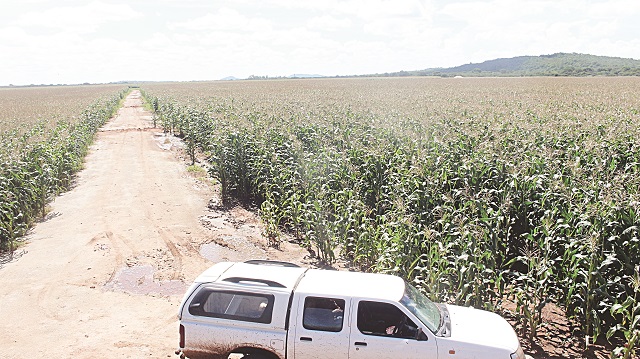Command Agriculture: Feeding nation through one focused vision


Vast tracts of land under maize, thanks to the Command Agriculture programme at Arda Trek-Antelope Estate, in Maphisa, Matabeleland South
Bruce Ndlovu
In years past, there has been concern from Government and other stakeholders that some farmers resettled during the country’s historic Land Reform Programme were not utilising the tracts of land authorities availed to them.
As biting economic challenges took a toll on the grain producers, many were unable to come up with the inputs necessary to make the country’s arable land productive.
Like other countries in sub-Saharan Africa, local farmers faced a few drought years over the past decade. In the 2015/16 season Zimbabwe came face to face with the harsh realities of an El Nino induced drought, as weather patterns continue to shift unpredictably due to global warming and climate change.
The Zimbabwe Vulnerability Assessment Committee (ZimVAC) 2016 Rural Livelihoods Assessment showed that the El Niño induced drought affected most parts of southern Africa and left 4,1 million Zimbabweans in dire need of food.
Rural food insecurity was projected to rise approximately to 30 percent from the 16 percent (1,5million people) which was estimated in May 2015. The hungry population rose further to about 4,1 million.
Faced with such grim realities and in its desire to find lasting solutions to drought, last year the Government came up with the Command Agriculture programme to stimulate its agricultural sector.
Announced in August last year, Command Agriculture is an agricultural scheme aimed at ensuring food self-sufficiency.
After resettlement must come maximum utilisation and the Command Agriculture programme has proved to be a masterstroke and perhaps the missing piece of the puzzle of the land redistribution programme initiated at the turn of the century.
Alongside its counterpart, The Presidential Input Scheme, Command Agriculture aims to capacitate the country’s farmers who in the past have cited the lack of inputs and financial assistance as the stumbling blocks to the full utilisation of the land at their disposal.
Money was hard to come by for Zimbabwean farmers in the past, as there was hesitancy to extend loans to them among some banks. Those that did, charged high interest rates while demanding collateral in the form of immovable property.
All this prompted the Government to intervene through the Command Agriculture programme, thus gearing the country’s all important agricultural sector for an all important turnaround.
Seed, tillage and fertilisers among other inputs were distributed around the country to grateful farmers most of whom were still reeling from the effects of the previous season’s drought and thus unable to capitalise their projects.
Instead of sitting on its laurels blaming uncontrollable forces like the erratic rainfall that the country received in the 2015-2016 agricultural season, Government took the bull by the horns and gave the country a unitary vision geared towards ensuring the country’s food security.
In what has been its first year, the programme which is expected to be implemented over a three year period, has gone beyond initial expectations, with this year’s harvest projected to exceed the targeted two million tonnes which was initially forecast.
As a turnaround from last year’s drought such figures are remarkable, showing the ample promise the programme has.
The timely and decisive intervention by Government has not been lost on farmers who now stand at the cusp of ensuring that the country’s populace is fed.
After the programme’s implementation, Zimbabwe Commercial Farmers Union president Mr Wonder Chabikwa, had nothing but good words for the government.
In the absence of Command Agriculture, he said, most farmers would have failed to produce maize, leading to serious shortage of food. “I cannot over-emphasise the impact of Command Agriculture in boosting maize production. Command Agriculture has greatly empowered farmers and increased capacity utilisation of land.
“Command Agriculture happened according to prescription. Last season, President Mugabe declared a state of disaster because of the severe drought. Coming out of such a scenario, many people will not be able to fund their operations. Command farming came in time to save the drought stricken farmers,” he said.
The success of the Command Agriculture programme has been accentuated by the excess rains that the country received this year.
After the El Niño induced drought left most of the country barren and parched, the heavens opened up generously this season and turned vast tracts of land into greenbelts of crops.
While the prayers of those that wanted a better rainy season after the droughts of the previous few seasons were answered, divine intervention alone would not have been enough to drag the country from a debilitating drought.
The timely Command Agriculture programme meant that they were boots and inputs on the ground to welcome the rain that bucketed over the country for most of the agricultural season.
Without sound policy and its implementation, what is a historic wet season would have gone to waste.
However, while the planting of crops is important, it would have been folly on the Government’s part to assume that this would be enough to guarantee a successful agricultural season.
Luckily, the Government had foresight to look at what is needed when the cropping season is over.
Last month, Vice President Emmerson Mnangagwa, who was charged by President Mugabe to spearhead Command Agriculture said the country had already secured funds to buy grain from farmers while millers had availed $8 million for the repair of damaged Grain Marketing Board silos.
He also announced that the country was suspending grain imports, thus taking the country’s food security matters into its own hands and nipping in the bud a dependency syndrome that had begun to hold.
“We have been using our money to import grain and that must stop. In the last three to four weeks we stopped importing grain as a country,” said VP Mnangagwa on March 9.
With food security still a priority, there is little doubt that the unity of purpose and strategy inspired by the Command Agriculture programme will go a long way in ensuring that Zimbabweans are fed now and in the future.











Comments